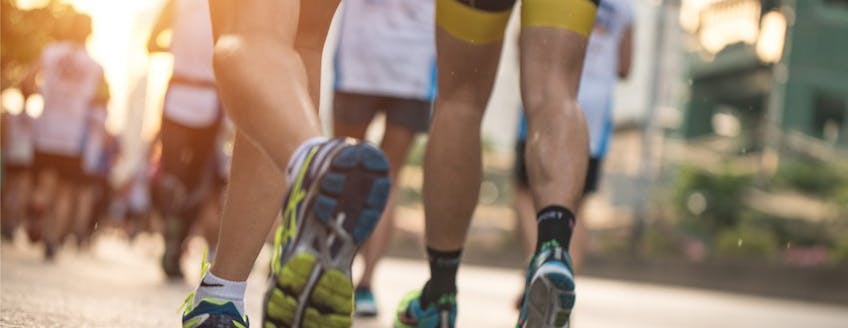The Right Mid Marathon Nutrition
There’s no denying that running a marathon is tough, but by eating and drinking what’s right for your body during the race can help make the day memorable for all the right reasons.
CARBOHYDRATE
During a marathon, the body will be churning through its energy stores including fat tissue and the stored form of carbohydrates known as ‘glycogen’ which is held in relatively small amounts in skeletal muscles and liver. For runs over an hour, it’s advised to take on small amounts of high-GI (glycaemic index) carbs from sources such as carbohydrate-electrolyte drinks to provide glucose to working muscles and maintain endurance performance.
So long as you’ve eaten enough pre-race you probably don’t need to refuel during the first hour of the race. For every hour afterwards it is recommended to take between 30 – 60 g1 carbohydrates per hour which is about 500 ml carbohydrate sports drink*.
The following snacks contain between 30 – 60 g carbohydrates:
- Large banana
- ¼ cup of raisins
- 2 dates
- 2 carbohydrate gels*
- Small handful of jelly sweets*
HYDRATION
During the marathon you will need to drink throughout to avoid dehydration and to keep your core body temperature stable. Everyone sweats at different rates; as such it’s important to find out your individual sweat rate during training to determine roughly how much fluid you will need to drink over the course. Having said that, when it comes to hydration it’s important to be flexible, for example if it’s a sunny warm day you may need to drink more to counterbalance the increase fluid loss from sweat. Although take care not to over drink which in rare cases can lead to a serious condition known as hyponatremia. Sip little and often around the course.
When the body sweats, salts or electrolytes are also lost and must be replaced. A salty snack or a carbohydrate electrolyte drink containing sodium‡ can enhance the absorption of water during the marathon.
Top Tips
Stick to the plan – Don’t try something new on race day. Training runs are a perfect opportunity to trial your race nutrition and hydration strategy. Try different sources of carbohydrates to see what you can tolerate, experimenting with different amounts and brands.
Avoid the catch up game - Don’t wait until the second hour is up before you wolf down your snack as your energy stores will already be depleting and you’ll be playing catch up. Start eating your snack around the 30 minute mark of each new hour.
Tasty tasty - Invest in something that tastes nice, the marathon is tough enough without having to force yourself to take a gel that tastes like socks. You’re far more likely to eat all of your chosen snack and get all the vital calories and nutrients you need if you like the taste.
Pack your snacks the night before – Pack your food and drink the night before, so if anything is missing you still have time to make a supermarket trip.
Pace bands – Stay on top of your nutrition strategy by jotting down rough time or mile stones to remind you when to eat/drink.
Know the course – The last thing you want to do during the marathon is accidentally run past a drink station when you need it the most. Before the race, look online for the course route map and make a note of where the drink and snack stations are located.
Post race snack - Take a carb and protein loaded snack in your bag to munch while you’re staring at your beautiful medal.
CONCLUSION
When it comes to nutrition and hydration strategies for the marathon, there’s no right answer, everyone’s different. By trialling your food and drink during training runs you can go into the marathon feeling confident you know what works for you. Take it all in your stride, and enjoy the race!
References
Jeukendrup A. (2011). Nutrition for endurance sports: marathon, triathlon, and road cycling. Journal of Sports Sciences, 29 Suppl 1, S91-99.
*Nutritional value will vary between brands
**Carbohydrate-electrolyte solutions should contain 80 – 350 kcal/L from carbohydrates, and at least 75% of the energy should be derived from carbohydrates which induce a high glycaemic response.
‡Carbohydrate-electrolyte solutions should contain between 20 mmol/L and 50 mmol/L of sodium, and have an osmolality between 200 – 300 mOsm/kg water.












